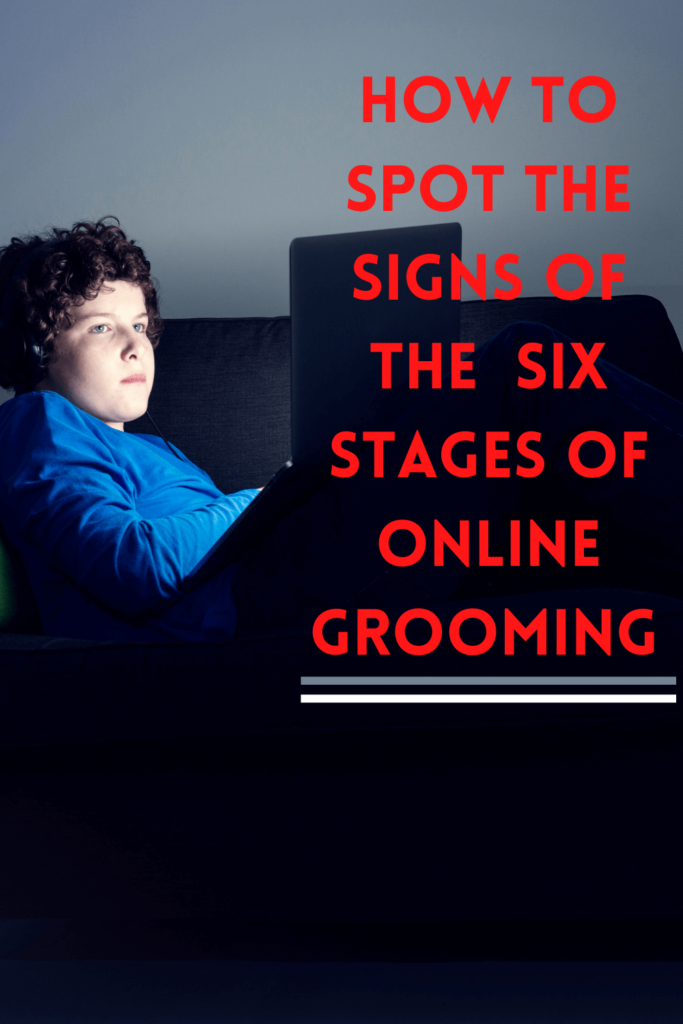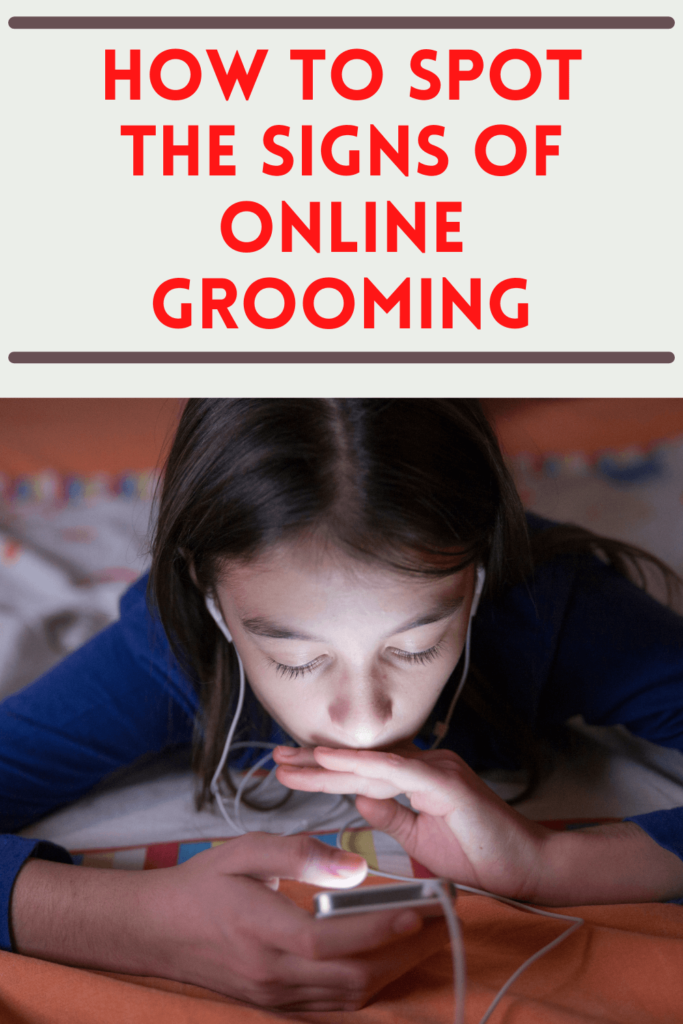
What is online grooming? And what are the stages of online grooming?
Grooming online happens when someone (usually an adult) ‘befriends’ and succeeds in gaining a child’s trust in order to take advantage of the child for sexual purposes. Grooming allows sexual predators to slowly overcome natural boundaries long before sexual abuse occurs.
When children connect and communicate on the internet with strangers, they put themselves at great risks indeed. Internet predators intentionally comb sites where children are sure to visit, they may search for their victims by interests, location, gender and so on.
Predators are able to piece together clues from their seemingly innocent communications with children and find out where a child lives, who their parents are, their school, closest landmarks or store and what their family situation is like.
Online grooming can take place either over a very short period of time or over a long stretch of. Predators are master manipulators who dedicate time and intentional effort to their craft. Initially, an online sex predator’s communication will appear innocent, they will present a kind and helpful posture, and then it progresses into dangerous territory, directed by the predator.
AD: Is Your Child Ever Online? Click to look Into Internet Safety Solutions
There are some red flags that should pique your interest and make you want to investigate your child’s online activity and communications further. Here are the stages and signs a child may be a victim of a predator’s grooming process:
Friendship Stage: Targeting And Gaining Trust
At the friendship forming stage, a predator establishes contact with their target. More often than not, predators target needy children – those who are abused and unable to tell, those with minimal or no parental oversight, those experiencing bullying and/or depression. Online predators are able to glean enough information from their victim’s social media posts to know a potential victim is vulnerable enough to be targeted. At this stage, a predator will appear helpful and harmless, will pretend to be a child themselves, will feign concern by asking the child details about their life and family structure. At this stage, a child would eagerly give information, happy to have made a friend, whiles the predator will only be gathering vital information to further advance their plans.
What to look out for :
- When your child has a new best friend out of the blue, and cannot wait to connect online after school.
- When the supposed friend is not known in person – an online bestie.
- Spends more time alone in their room with phones, laptops or tablets.
- When your child isn’t forthcoming about the new friend ( predators often coax children into secrecy).

Relationship Forming Stage: Filling Child’s Emotional Needs
After establishing contact and gaining access to the child the predator will begin strengthen their ‘bond’ by getting personal and asking personal and private questions. Then they will empathize, offer helpful suggestions or tell a sob story of their own to identify with the child and create familiarity.
Predators will take things further by ingraining themselves into their target’s life. This may include monetary gifts, toys, offering to take a child places and promising things like acting and modeling careers. In cases where a predator wants to groom parents or a family to make access to a child easier, the may offer to help the family as a whole. Example a predator may offer to help a single mother with bills, chauffer kids and so on.
What to look out for:
- Gifts (expensive or not) from other adults
- Be especially wary of electronic device gifts from adults – it may come with location tracking software and proxy bypass installations. These installations will allow a child to access websites and other applications banned on your network.
- Be wary of overly generous offers from new friends
- When your child begins to ask questions out of the ordinary- it may be to feed the predator’s enquiries.
Risk Assessment Stage: Gauging Level of Threat
At this stage an online predator will begin to assess the level of threat parents and caregivers pose to them. They will begin to enquire about family bonds. They may ask such questions as how much time a child gets to spend alone or how much monitoring and supervision a child has. This is the stage a predator tries to see how close a child is to their family. And gauge whether their actions may be reported and if the child will be believed at all.
This is an interview with two child sex offenders. One of them happens to be a highly regarded school teacher. In the interview they indicate that a top deterrent to online sexual predators is a child whose electronic devices are religiously monitored by parents and guardians. When a predator realizes that a child has a close relationship with the adults in their life, is closely monitored, and aware of online predator tactics and activities, they quickly disconnect and channel their energies elsewhere.
What to look out for:
- Child begins to enquire about your home internet security setup
- Child begins to request more liberties online (e.g. begs to use their laptops in their room, requests to stay online longer)
- Child disconnects from WIFI and begins to use cellular data at home.

Parental control software is a valuable resource parents can use to stay on top of their children’s online activity. For a child’s safety, monitoring is a must. This is a good monitoring software I recommend.
Exclusivity Stage: Isolating The Child From Family And Friends
At this point of the online grooming stage, a predator works extra hard to alienate a child from family and friends. Online predators do this so they can become center stage in a child’s life.
Predators will use information gathered at the friendship and relationship stages to brainwash their victim into thinking they (predator) are the best thing to happen to a child and everyone else is wrong, controlling or jealous.
Where physical contact is a possibility, they will spend as much time alone with a child as possible. They will often heap empty compliments on the child, and take their side when there is a family conflict, all to deepen a child’s attachment and dependance.
What to look out for:
- Child begins to detach and isolate from family and friends
- Child stops discussing issues they would otherwise freely discuss
- Child prefers to spend time online or in-person with their “new friend’ over everybody else
- More sentences start to begin with “predator(put name here) says…”
Sexual Stage: Sexually Desensitizing The Child
When a sexual predator successfully builds emotional dependence with a child, they go ahead to progressively sexualize the relationship. At this stage, the predator will try to debunk and dismiss any sexual advice parents and/or caregivers have given. They will demonize parents and make the child think the adults in his/her life are just preventing them from experiencing something extraordinary.
A predator will do this by finding ways to bring up sexual topics, example ask questions like, “Do you ever masturbate? It is a glorious experience. I can show you how.”
They may share photos, and videos of themselves and coax a child into returning the ‘favor’. A predator may also show images of children without clothes and child porn to make it look like a normal experience. A predator will also exploit a child’s natural sexual curiosity and use stimulation to advance the sexual nature of the relationship. The predator does this to remove all barriers and prepare the child for in-person sexual encounters.
It is very important to keep an open, age-appropriate, honest and respectful line of communication on sex and sex-related issues with your child. And when you see any sexual curiosities and behaviors that aren’t age-appropriate, promptly investigate, get to the bottom of it and protect your child. Judgement and condemnation will only push a child further into a predator’s grip.
Conclusion Stage: Maintaining Control
When a predator successfully begins sexual abuse, they use threats, blame and secrecy to maintain the child’s participation and continued silence. Predators will manipulate a child to think only them (predators) have the child’s emotional needs at heart.
Online predators are known to use information provided by children as well as graphic sexual images they coax out of children to blackmail their victims.
The main goal here is to maintain participation and secrecy.
What to look out for:
- When your child appears withdrawn and sullen, it is time to dig deeper.
- When the presence of or the mere mention of a particular person changes their mood and demeanor negatively, look closely at their relationship and ask questions.
- When a particular phonemail or text message creates a mood change, investigate that call or text.
Research suggests that the relationship forming stage is the most dominant of the stages of online grooming. Also these stages of online grooming don’t necessarily follow a sequential order.
The reality is that it may be difficult to identify and nip grooming in the bud because predators are crafty and usually rope in caregivers and parents by befriending them and appearing helpful to unsuspecting adults.
Parents’ best bet to catching online grooming is open, honest lines of communication and staying abreast with children’s online footprint by the use of parental control software.
Help keep my stories free! Do you shop on AliExpress? Kindly Click here to support me. I am an AliExpress Associate so when you click my link and shop, I may earn a small commission at no cost to you. And that is how I keep my stories free.
At MissKorang we strive to bring you life stories that teach timeless life lessons and, some of those stories, like this one, are real life stories submitted by our readers and shared with their permission. Identifying attributes are edited out to protect our contributors’ privacy.Can you leave your thoughts with these kind people in the comments? If you want to send us your experience, email us at submissions@misskorang.com. Or submit using this anonymous form. Please do not reproduce any part of this content without permission from us. Our stories contain affiliate links. When you click and make a purchase, we may earn a small commission at no extra cost to you.
At MissKorang we strive to bring you life stories, stories of motivation, cautionary tales and many more. We believe storytelling is one of the most powerful means that we have to influence, teach, and inspire. Our stories contain affiliate links. When you click and make a purchase, we may earn a small commission at no extra cost to you.
MissKorang
I am a mom, wife, believer in God and a lover of stories. I love storytelling because I believe it is a potent means to inspire and educate.





That is scary. I didn’t even know it had a name. Wow. Thanks for sharing.
I have not young children or grandchildren but this is a must read for those who do. Thank you for posting.
This is so scary. I am so thankful that my boys are grown. They used to complain about how strict I was about their use of technology, but they stayed safe.
This is such important information to get out! Thank you for sharing. As my children get older, I am going to make sure I remember this stuff to protect them
This is great information. So sick that there are people out there like this!
Such important info that you are getting out there. Keep informing! Thank you!
This is SUCH an important topic that doesn’t get a wide enough audience. Thank you so much for sharing.
This is such important information for parents of young children to know! Thank you for writing this post. Knowledge is power, and it is very helpful to know what signs to look for.
Great information. Parents are the greatest deterrent to online predator’s – I like that!
I tried to make both of my kids aware of these behaviors as they got older. My daughter was all over the online creeps when they would try to approach her and used to block button often. Great info!
So important to be vigilant and to talk openly about topics such as this. We have a code word with our children to keep them safe from “mom’s friend” or “your neighbor” that may try and pick them up from places. We talk with them from time-to-time about stranger danger, but also include tid-bits about how seemingly nice people can have bad motives. Thanks for shedding light on the subject.
This is so scary and creepy. Definitely needs to be addressed in every families homes!
Such great information. I have a talk with my boys about this every couple of months and have since they were small. They can be too trusting.
This is such a scary topic and one that needs attention. Thank you for addressing it and giving us a good summary of all the warning signs.
Scary stuff. So many creepy and unscrupulous people out there on the web. Good information to share.
Scary, I think there needs to be class warning kids (and parents) about the dangers instead of a quick mention.
I’ve heard the grooming topic coming out more and more in the past few years. I hadn’t ever realized how deep it goes or how it happens. Thank you so much for enlightening us to what is going on. Protecting the kids is a must.
This is really scary stuff. We had very frank conversations with our kids about “creepers”, as we called them, from a young age to help them understand that we never know for sure who is behind the keyboard.
We discuss “tricky people” in our home, but this is just so scary. Thank you for writing about this very important topic! Makes me have a pit in my stomach.
Great reminders to always stay vigilant when online!
Creeps! This is similar to how gangs work, too – vulnerable kids looking for connection and a place to fit in.
Thank you for writing about this.
Great article! I used to teach internet safety in schools to both kids and parents. Its amazing how little the general public actually knows about the dangers the internet brings. And these predators absolutely know what they are doing, and are so smooth, that even some adults are getting sucked into their stories. Its very scary.
So many things to look out for as parents. Thanks for the reminders!
Did not know it had a name for it.Scary.
Such important information to protect our children!
And this happens more than any of us realize. I’m in the mental health field and see it all too often.
Online predators and these online grooming tactics are real! Someone tried to lure my daughter on instagram, claiming he was going make her a model and “should he send her a plane ticket?”
I felt so helpless and angry. Thanks for the suggested parental control tools. I am definitely getting them.
I love how you separated the what to look for signs. So helpful for having specifics to keep an eye out for with social media taking over kids lives.
Yes. Online grooming stages, take many forms, but knowing what to look out for is very important to protecting children from Online Predators
wow!!! thank you so much for this great article. believe me you don’t know how much it helped me
Thank you for sharing. I thought the post was about something else. But I am glad I read it because of the good information about adults “grooming” kids through the internet to lead them to dark places and danger. Again, thank you!